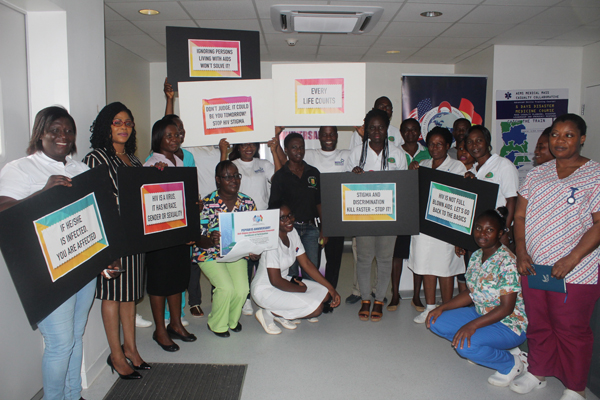Health workers holding placards with anti-stigma messages
“Before I start, I have a question and I want us to give an honest answer. Supposedly you tested positive to HIV in this hospital, will you want to receive treatment at this health facility?” asked Rev. John Azumah.
Yes! a nurse in the room said. But she was the only one courageous enough to answer in the affirmative, the simple but difficult question.
The other participants, including senior health officers, answered in the negative.
“Never!” a nurse expressed.
“Why would you not want to receive treatment here?” Rev. Azumah inquired further.
“The moment I enter the ART Clinic and I test positive then my fellow nurses will start pointing and murmuring, ‘So as Aunty Winifred is working here she also has the sickness of those people, and it will start spreading,’ so for that reason when I test HIV positive in this hospital I will not want to receive treatment here,” she explained.

“No! I will not take treatment here. It is not the people on the ARTs but the nurses in this facility,” a senior health officer said.
“Already, I am suffering from secondary stigma because as I walk on the compound I hear them saying, ‘Eii not knowing Aunty Mercy herself is sick that is why they put her in the clinic’ and this has gone on for years in this hospital, even doctors and my own colleagues stigmatise me because I work in the area of HIV,” another nurse stated.
One enemy in the battle against HIV is stigma and this exercise shows that stigmatisation has the potential to kill faster than the disease will take to end a person’s life.
Statistics
According to the 2017 HIV Sentinel Survey, 313, 062 Ghanaians are living with HIV but not all of them are on treatment due to stigmatisation.
“A stigma study was conducted among persons living with HIV and this stigma index gave us a high prevalence of 18.1 per cent among persons living with HIV and we saw that it was internalised stigma and stigma at other places like the health facility,” Rita Afriyie, technical coordinator for the Technical Support Unit, Greater Accra Region, Ghana AIDS Commission (GAC), revealed.
She said there are people living with HIV who have gone into hiding because of the attitudes of nurses at the health facilities and have, therefore, defaulted in their treatment.
On December 1, Ghana joined the world to celebrate World AIDS Day with the global theme: ‘Know Your Status’.
Country wise, a sub-theme: ‘Test, Treat to Suppress New HIV Infection’ was adopted to complement the quest of the country to achieve its 90-90-90 targets.

Madam Afriyie said GAC wants to reduce new infections among the general population and, thus, further reduce the country’s prevalence of the health condition to its current figure of 1.67.
“We have observed that if we want to achieve our 90-90-90 fast-track targets by 2020 and end AIDS by 2030 there are some barriers like stigma we need to ensure that we work on so more people can come to voluntarily test and be able to disclose their status to their community without any shame and go to the facility for ART treatment,” she indicated.
Stories
The stories about stigmatisation and discrimination can best be told by those who experience it directly.
“Eighteen years ago, my wife and I had our HIV test at the Tema General Hospital. When the results came and the nurse had to disclose our status to us, this is what happened.
Eii Osofo (pastor) you and your wife are living with AIDS! So I asked her what shall we do? Then she said if you have any property you can go and start selling them because you are going to die.
My wife collapsed at the consulting room after the news. How we managed to leave the hospital only God knows,” Rev. Azumah observed.
“When you are HIV positive, it is only the words of your doctor or nurse and your pastor that you will hear. It is what they tell you that can calm you down and give you hope so when those people reject you, you lose hope,” Mrs. Azumah added.
The couple who are now heart-to-heart ambassadors of GAC said they had to encourage themselves to be able to seek treatment. They have an undetectable HIV status and have four children who are all HIV negative.
“I am able to disclose my status to health officers anytime I go to a facility for medical care, but it is not everyone who can do that,” she revealed.
Charity Owusu-Danso, also a heart-to-heart ambassador with an undetectable HIV status, said treatment at the ART Clinic is good but outside the clinic, everything changes with nurses often referring the people living with HIV as ‘those’ people; a term she feels is derogatory.
“At the theatre, it is something else. There is a code behind my ANC folder indicating my status; I was in the theatre recovery when I heard a nurse saying, does Aunty Mercy think ‘those’ people are for her alone. So I asked myself who she was referring to as ‘those’ people? she queried.
“But we have our friends who do not want to come to the clinics simply because of the attitudes of nurses, you see when we do not change the same life we pledge to save we end up killing us,” Mrs. Owusu-Danso said.
Now we have been empowered to know our right as patients but cannot take on health professionals who are the same people taking care of us. CHRAJ empowered us using 1406 to report complaints of discrimination at health facilities.
For the past 16 years, Mrs. Owusu-Danso has been living with the health condition; she has six children— three of whom she was delivered of when she was HIV positive— are all negative, including her husband.
PEPFAR Intervention
HIV-related stigma and discrimination can be damaging to the health and well-being of people living with HIV, particularly when occurring in health facilities.
Ghana’s national HIV response recognises that the presence of stigma and discrimination in health facilities is a serious problem and that addressing it is crucial to ensure equitable access to care, improve service delivery, and foster health facility environments that promote non-stigmatising and non-discriminatory care.
A stigma and discrimination-reduction activity has, therefore, been carried out by Health Policy Plus (HP+), funded by the U.S. Agency for International Development and U.S. President’s Emergency Fund for AIDS Relief, (PEPFAR), in partnership with the Educational Assessment Research Centre (EARC) and the Ghana AIDS Commission (GAC), to address HIV-related stigma and discrimination in health facilities.
Madam Afriyie said GAC had organised a lot of training for health facilities to build the capacity of health works in addressing the issue of stigma against people living with HIV in collaboration with partners.
“We used to receive cases from people living with HIV about them being stigmatised by healthcare workers but we started building their capacity and it has reduced,” she said.
The endline evaluation of the project which compared baseline and endline survey data from health facility staff demonstrated that the intervention was effective.
Results show a significant reduction in the drivers and manifestations of stigma and discrimination from the brief intervention.
Facility clients and staff also reported that staff behaviour toward clients had improved considerably since before the intervention.
The majority of indicators measuring stigma among health facility staff improved. The largest changes (both in magnitude of change and statistical significance) occurred in fear of workplace HIV transmission and the resulting stigmatising avoidance behaviours.
Mrs. Mercy Acquah-Hayford, head of the ART Clinic at the Ridge Regional Hospital, indicated that if people are encouraged to test and know their status and the healthcare personnel do not stigmatise them, “it means they will not go into hiding they will go for their medications and help improve the gains we have made so far.”
The US President’s Emergency Plan For AIDS Relief (PEPFAR) launched a year-long campaign in May this year under the theme: ‘Saving Lives Through American Generosity & Partnership’ as part of PEPFAR’s 15 years anniversary.
Madam Dzid Enyoman Kwame, PEPFAR media specialist, explained that the anti-stigma and discrimination campaign is all about showing love to persons living with HIV and letting healthcare professionals understand that stigma is more dangerous.
Thankfully, she said the ARTs is doing wonders for people living with HIV. They are living longer, healthier and meaningful lives but because not all the people living with the health condition are receiving treatment, the country’s progress towards its targets is slow.
“If you stigmatise and discriminate against persons who live with the disease, they will not be willing to disclose the status. The rippling effect is that they cannot be put on treatment. Subsequently, they will keep infecting others and Ghana as a nation cannot achieve the fast truck UNAIDS goal of 90-90-90 within the stipulated time frame. If we discriminate against persons living with HIV, we stand a greater risk and will not be able to achieve and AIDS free generation,” she opined.
“PEPFRA is hoping that Ghana will be able to sustain this programme so that by 2020, we can achieve all the 90s we stipulate earlier on and also by the year 2030, we can achieve epidemic control,” she concluded.
By Jamila Akweley Okertchiri


